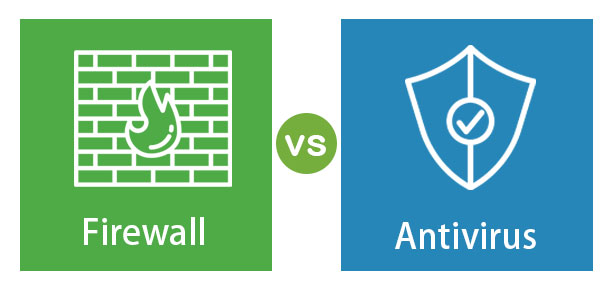Updated March 27, 2023

Difference Between Firewall and Antivirus
Firewall and antivirus both are the protection frameworks for our devices. In both cases, the weaknesses differ. Firewall and antivirus are the main differences as the firewall serves as a barrier to the network’s incoming traffic. Both Firewall and Antivirus functions in various ways, such as Firewall, emphasize data inspection from the Internet to the computer. An antivirus instead highlights malicious inspection steps, such as identifying, detecting, and removing the program.
What is a Firewall?
A firewall is a standard approach that protects your local computer assets against external threats. A firewall is designed to filter IPs from the network to your computer. It also protects your local system as well as your network efficiently and allows you to access the internet or wide-range network at the same time. Firstly, it guarantees the transfer of any traffic from outside to inside or vice versa. This uses a trusting system with a safe operating system that makes this resistant to infiltration. Basically, there are 3 types of firewalls: Circuit gateway, Application gateway, and packet filters.
- Circuit Gateway: It resembles an application portal but has some additional features like creating a new connection between the remote host and itself. The IP source address in the packets is also changeable from the IP of the end-user. This is how the source IP address is hidden.
- Packet filter: Packet filters are also called filtering and stream filters. Packet filter passes the packet after some rules have been applied (forward or discard) and makes the decisions on the results.
- Application gateway: The Proxy server is also identified. Because it functions as a proxy or replacement for the application, selects the flow of traffic, and covers the source IP from outside the world.
What is Antivirus?
An antivirus is a software application that provides Internet protection against malicious programs. Nevertheless, removing them from the environment connected to the Internet is extremely hard or almost impossible. The antivirus follows a detection, recognition and elimination strategy.
- Removal: Eventually, Antivirus takes steps to delete and restore the original backup file/program from the infected file.
- Detection: The app detects malware attacks and locates the file or application that is corrupted.
- Identification: It recognizes the type of virus after it is identified
Due to the improvement of viruses and antivirus technology, several generations have evolved from antivirus. Historically, this was not the scenario until viruses easily detected and removed code fragments were discovered.
Head to Head Comparison between Firewall and Antivirus (Infographics)
Below are the top 7 comparisons between Firewall vs Antivirus:
Key differences between Firewall and Antivirus
Let us discuss some key differences between Firewall vs Antivirus in the following points:
1. A firewall can be employed for software as well as hardware; antivirus can only be applied for software.
2. Antivirus conducts screening, including identification, naming, and deletion. Alternatively, firewall controls and processes input and output sets.
3. External attacks are only managed by Firewalls, while Antivirus manages external and internal threats.
4. When the attack firewall is checked, certain rules are applied based on inbound packets. In comparison, malicious files and applications corrupted by antivirus are scanned and checked. IP spoofing and routing attacks are strategies that may theoretically compromise the protection of the packet filters.
5. A network protocol firewall protects your device, thereby blocking vulnerable port packets, whereas an anti-virus prevents malicious data on the level of the file.
6. The monitoring capability of the firewall is based on a pre-defined set of rules. Whereas the monitoring capability of antivirus is based on techniques imposed by the manufacturer.
Comparison Table of Firewall vs Antivirus
The table below summarizes the comparisons between Firewall vs Antivirus:
| Firewall |
Antivirus |
| The hardware and software implementations are found in the firewall. | Antivirus can only be implemented in the software. |
| Its monitoring capability is based on a pre-defined set of rules. | The manufacturer imposes its monitoring capability techniques. |
| Also, external threats are dealt with a firewall. | All internal and external threats are handled by antivirus. |
| Attacks like IP spoofing and routing attacks are possible with the firewall counter. | Antivirus does not require counter attacks after the malware is removed. |
| A firewall does filtering and monitoring. | Antivirus is used to search compromised apps and computers. |
| A firewall monitors the inbound packet threat. | Antivirus monitors the threat of malware. |
| The firewall inspects incoming packets. | Antivirus inspects malicious software residing in the computer. |
Conclusion
The cyber-world is growing at an astonishing rate. It is, therefore, unclear that your cybersecurity approach will identify the best firewall and antivirus. Antivirus and firewall apps are significantly different. The anti-virus deletes infected files by isolation or deletion, while the firewall blocks malicious data from device entry.
Recommended Articles
This is a guide to Firewall vs Antivirus. Here we discuss the key differences with infographics and comparison table. You may also have a look at the following articles to learn more –

